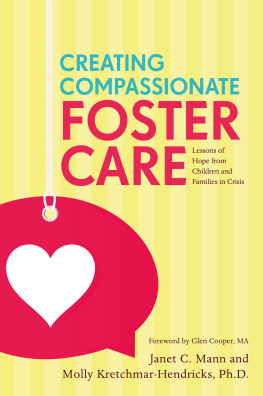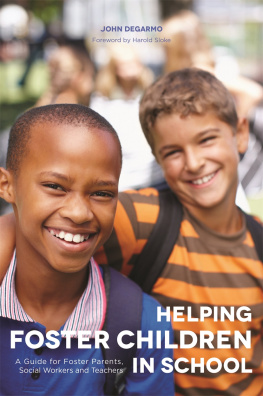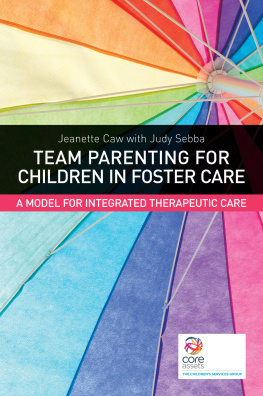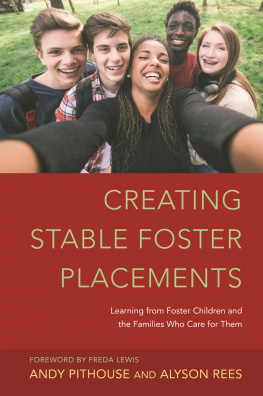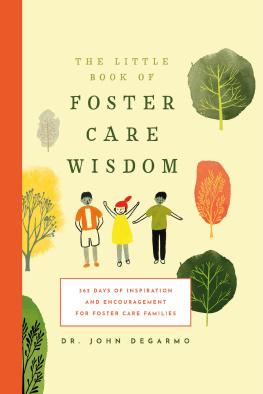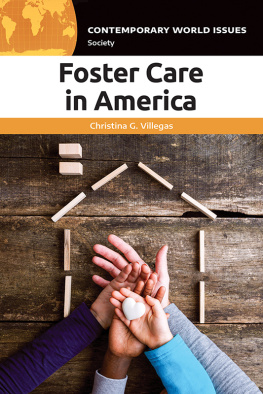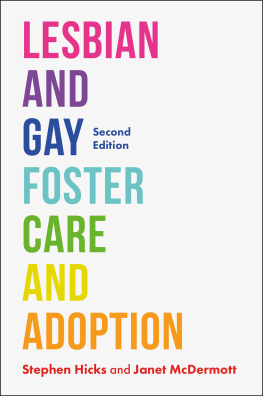
CREATING
COMPASSIONATE
FOSTER
CARE
Lessons of Hope from Children and Families in Crisis
Janet C. Mann and Dr. Molly D. Kretchmar-Hendricks
Foreword by Glen Cooper, M.A.

Jessica Kingsley Publishers
London and Philadelphia
CONTENTS
FOREWORD
Janet and Paul Mann examined the mixed results of their efforts in traditional foster care and asked the question, What if? What if we made biological parents part of the solution rather than treating them as the problem? What if we offered parents the same level of care that we give to their children? What if we created a community of professionals to provide a wide range of services for families? What if we opened our homes and hearts to both children and their parents so that they can heal together? By doing just that, they began an odyssey that sets a new standard for best practices in foster care.
This book tells the truth about the demands, anguishes, and successes of caring for deeply troubled families. With engaging stories to illustrate the underlying theory, it will touch your heart and expand your thinking as you explore the complexity and humanity of the lives of foster children, their parents, and those who serve them.
The authors bring decades of theory and practice to life. Janet Mann reflects on what she has learned from her extensive involvement with foster children and their families, while Molly Kretchmar-Hendricks, an academician and gifted teacher, outlines the clear research-based, theoretical framework that underlies the practice. Both the theory and the lived experience are compelling in their own right but the combination provides a much needed primer for creating a more effective and compassionate foster care system. In addition, it provides theory and clinical insights, which reach far beyond the realm of foster care to illuminate the fundamentals of responding to the needs of vulnerable families and children.
My involvement in this story began by reading an article in our local paper featuring an innovative foster care program, The Childrens Ark. As a family therapist with years of experience as a foster parent, working with foster families, and consulting with a variety of foster care programs, I tend to be a bit skeptical of new and improved approaches. The Childrens Ark was different. Acting on the wisdom that we need to treat families rather than individual children, they were proposing the radical idea that it is imperative that we take parents into care along with their children.
I was impressed that, based on the article, Janet and Paul Mann seemed to have their rescue fantasies in check, and they did not have a psychological, religious, political, or social agenda that they wanted to foist on foster children and their families. In addition, they spoke with knowledge and maturity about providing a comprehensive approach, which convinced me that they could turn words into action.
After reading the article, my thought was that I would love to take part in this exciting and worthwhile project. Then, out of the blue, I received a message from Janet Mann saying that she had heard about my interest in the clinical application of attachment theory for the foster care system and wanted to talk to me about The Childrens Ark. I was delighted with the opportunity to spend the next 15 years engaged in such rewarding work. What I have learned since is that Janets determination is an unstoppable force and even if I had wanted to decline, she would not have taken no for an answer.
The timing was perfect. My colleagues, Kent Hoffman and Bert Powell, and I were looking for more opportunities to pilot the attachment-based early intervention program, Circle of Security (COS), which we were developing. Janet and Paul were eager to incorporate this approach. The Childrens Ark became one of the crucibles for the unfolding intervention and, in turn, COS became the organizing principle for The Childrens Ark. This symbiotic relationship proved central to the development of both programs. To add to our good fortune, we met Molly Kretchmar-Hendricks, who has expertise in attachment theory and research. It was an unexpected gift to find someone with her extensive background and depth of knowledge residing in Spokane, and she became a tremendous asset both personally and professionally.
I was a consultant at and advocate for The Childrens Ark, but my central and most rewarding role was leading weekly COS parent groups. The opportunity to use ongoing videotape reviews with families was as much a gift to me, both personally and professionally, as it was for the parents. As always, when working with families who are struggling, I felt a tremendous sense of gratitude and humility in witnessing parents overcome profound obstacles which, if I were in their shoes, would have overwhelmed and stymied me.
The Childrens Arks level of involvement with families was new to me. The intimacy of long-term, day-to-day, 24-hour collaboration between staff and parents for the benefit of the children brought a richness that deepened everyones experience. To be clear, boundaries and roles were rigorously maintained, but the staffs willingness to pour their hearts into these families was not lost on the parents, and in return the parents willingness to invite us into the pain and joys of their lives was an opportunity we fully embraced.
Bert, Kent, and I made good use of our learning at The Childrens Ark to augment the broader applications of COS, which has flourished and grown over the years. We carry lessons from our time at The Childrens Ark with us as we travel throughout the United States and around the world to train professionals in the use of COS early intervention for families with young children. In my 40 years of clinical work with families and my travels in the US, Europe, Asia, Africa, and Australia, I have been introduced to many foster care programs. The Childrens Ark continues to be the best example of an intensive foster care approach that I have ever encountered.
There is no easy recipe for fixing the multitude of problems in our child welfare system. However, The Childrens Ark is a compelling, multifaceted, example of how lasting change can be achieved through clinical sophistication, a working understanding of relationship needs, and a profound and enduring commitment to each family. It clarifies that, even if we develop the political and economic motivation to adequately fund child welfare programs, working with profoundly traumatized families will always depend on courageous individuals willing to bear the many heartbreaks of this demanding work.
Glen Cooper, M.A.
Circle of Security International
Spokane, WA
PREFACE
Too often children pay the price for the adversarial processes created when legal systems, child protection services, and parental rights collide. Children in foster care are at the mercy of judicial systems that are not always well informed; caseworkers who are overwhelmed and under-supported; and parents (both birth and foster) who often cannot see beyond their own needs, fear, and pain to recognize what is in their childrens best interests.
In response to these challenges, Janet and Paul Mann, of Spokane, Washington, dedicated more than 20 years of their lives to foster care, keeping the well-being of the children entrusted to them at the center of their work. Recognizing that separation from parents often became the biggest obstacle to reunification, the Manns founded The Childrens Ark, a program that offered parents the opportunity to reside, under supervision, with their children. This innovative approach to foster care focused on the childrens best interests but also addressed, with compassion, the needs of their parents while working to educate the professionals who were responsible for custodial decisions. Informed by attachment theory and the Circle of Security intervention, and with its guiding principle being in relationship, The Childrens Ark left an indelible imprint on our child welfare community.
Next page
